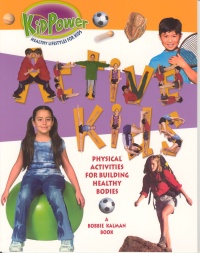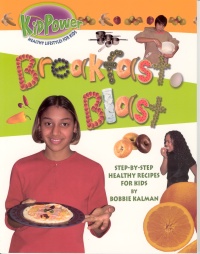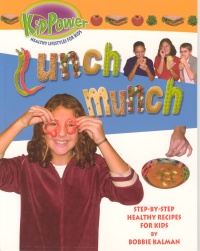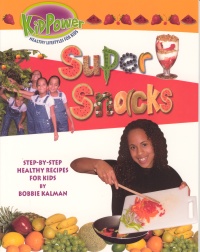| ________________
CM . . .
. Volume X Number 8. . . . December
12, 2003
excerpt:
The four books in the "Healthy Lifestyles" subset of the "Kid Power" series respond to the challenge of those North American children who are not only out of shape but who also do not make good choices in the foods they eat. The initial volume, Active Kids, speaks principally to the area of physical fitness. It provides a simple fitness self-test, and then shows how those who did not score well can gradually improve their fitness level. The authors' approach is encouraging, practical and realistic, and they frankly acknowledge that significant improvements in fitness will only occur over time. The remaining three books, Breakfast Blast, Lunch Munch and Super Snacks, address the matter of eating healthy. Each book begins in the same manner by describing the seven essential nutrients a person's body needs (focusing particularly on the importance of water), by identifying and providing examples of the four main food groups, by offering safety tips regarding food preparation, and by defining cooking terms. The remainder of each book consists of 9-10 child/adolescent-friendly and quick-to-make recipes for breakfast, lunch or for between-meals snacks. The two meal-based books each conclude with a week's menu based on the recipes found in that book. Each recipe is dealt with via a pair of facing pages, and the step-by-step instructions are illustrated with coloured photographs which show both male and female adolescents of various racial groups being involved in the food preparation. While Kalman lists the ingredients and quantities needed for each food being made, cooking neophytes would likely have appreciated another list detailing the cooking implements required to prepare that particular recipe, something Ken Kostick did in his Little Kenny in the Kitchen: Ken Kostic Cooks for Kids. In Breakfast Blast, Kalman is very much the realist and recognizes that many children/youth skip the most important meal of the day because they elect to stay in bed until the very last moment before dashing out the door to school. Assuming that it is the kids, themselves, and not their parents, who make their breakfasts, she includes among her recipes many that can be made the night before and can be consumed cold. Kalman is, perhaps, less realistic in her Lunch Munch recipes, especially if these are food items to be consumed publicly in a school before peers and in the presence of social pressure. "Potato Boats" taste good and are healthy as is "Zesty Rice Salad," but how many kids will willingly carry them to school? The 10 items in Super Snacks are most tempting alternatives to the chips and other processed foods gobbled down after school and between meals by hungry teens and pre-teens. A couple of them, "Snack Pizzas" and "Simply Super Subs," would also make fine lunch substitutes. This quartet of books certainly belongs in school and public libraries; however, it is unfortunate that, given the amount of overlap in the opening 9-11 pages of the three cookbooks, they were not combined into one single, and, therefore, cheaper book. Recommended. Dave Jenkinson teaches courses in children's and adolescent literature in the Faculty of Education, the University of Manitoba.
To comment
on this title or this review, send mail to cm@umanitoba.ca.
Copyright © the Manitoba Library Association. Reproduction for personal
use is permitted only if this copyright notice is maintained. Any
other reproduction is prohibited without permission.
NEXT REVIEW |TABLE OF CONTENTS FOR THIS ISSUE
- December 12, 2003.
AUTHORS
| TITLES | MEDIA REVIEWS
| PROFILES
| BACK ISSUES
| SEARCH | CMARCHIVE
| HOME |



